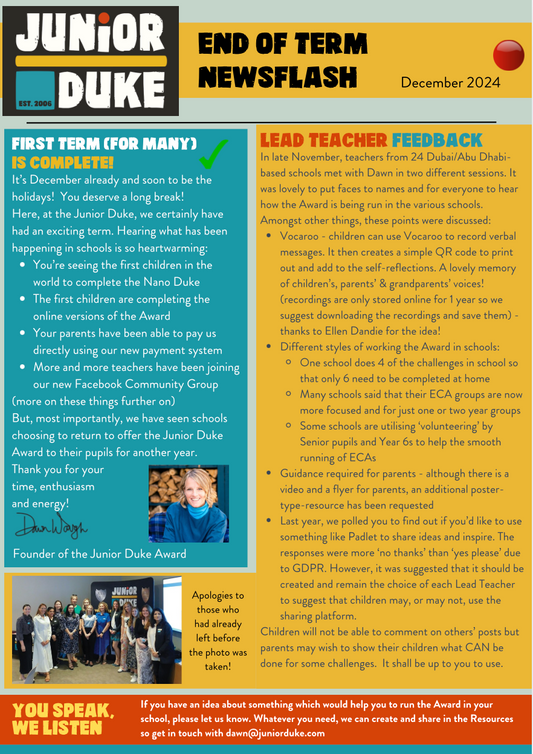
Unlocking Success: The 9% Reality of Parental E...
 The 9% Reality: Why Parental Engagement is Essential for a Child’s Success
The 9% Reality: Why Parental Engagement is Essential for a Child’s Success
Head Teachers in schools around the world are well aware that education extends far beyond the walls of the classroom. However, a striking statistic underscores just how limited our direct influence is: by the age of 18, only 9% of a child's life will have been spent at school. This fact highlights an undeniable truth; parents play a crucial role in shaping their children's development, and as educators, we must support and guide them in this journey.
The Power of Parental Influence
Parents are a child's first teachers, and their influence extends well beyond academic achievement. The habits they model, the life skills they teach, and the values they instil all contribute to a child’s ability to navigate the complexities of adulthood. While schools provide structured learning and foundational knowledge, the home environment fosters character, resilience, and independence. If we truly want our pupils to be prepared for life beyond the classroom, we must actively engage parents in their children’s learning and development.
Many parents don’t want their child to be considered inept by their housemates when they move out of home. A friend's child (let's call her Betsy) moved into her new apartment and was met by one of her new housemates who held out a pot with an egg in it. She asked Betsy if the pot was big enough to cook an egg. Betsy thought it an odd question but said,
'Yes. Why would it not be?'
The response was, 'I don't know how big an egg gets when it's cooked.'
Let’s make sure our children are prepared for leaving home! However, this journey is long and slow and steady and must be started as early as possible.
Asking Sara Village School (Saudi Arabia)’s Principal, Richard Charlesworth how important he thinks parental engagement is in a child’s development, this is what he had to say, "It's the most important factor in determining a student's holistic development and academic success. Students with engaged parents perform better across the board regardless of their starting points. This is why initiatives like the Junior Duke are really helpful in encouraging all parents to take a greater role in developing the independence of their children along with their skills and abilities. These skills directly transfer into their capabilities and potential within school."
Supporting Parents in This Role
Many parents understand the importance of their role but may not always know how best to support their child’s development beyond academics. This is where schools can provide meaningful guidance. One tried and tested, effective way to do this is by offering the Junior Duke Award to pupils.
Developed by a primary teacher in 2006 purely for her one school in Glasgow, the Junior Duke Award is now being offered in schools throughout the UK as well as in 40 countries. Over 50 schools in the Council of British International Schools are choosing to offer the Award and enjoy that it provides a simple yet structured framework that encourages children, aged 3 to 13, to develop essential life skills, resilience, and independence. From practical tasks like cooking and time management to fostering perseverance and teamwork, the program offers clear, achievable goals which parents can support at home. By implementing this initiative, schools empower parents with a roadmap to help their children become well-rounded, capable young adults.
Richard Charlesworth added, "The Junior Duke has been an excellent tool to facilitate parental engagement within our school. Our PTG helped by organising special days on the compound where families could get together and do some of the challenges collectively. Parent feedback about the programme has been very positive and the quality of the booklets produced has been impressive. The students are all very excited when they get to finally hand in their booklets."
Maryam Bulbulia, from Qatar International School said, "When parents are involved, children feel supported at home and school. It helps with both their confidence and learning. The Junior Duke gives parents a way to be part of that journey."
Jenny Graham, from Amnuay Silpa School in Bangkok said, "We view parental engagement as a vital component of academic success. When parents are actively and appropriately involved in their child’s education, students tend to be more motivated, committed, and experience greater overall well-being."
A Collaborative Approach to Education
By fostering stronger school-parent partnerships, we can bridge the gap between home and school learning. Encouraging parents to share good life habits, model problem-solving skills, and instil a sense of responsibility in their children complements our efforts in the classroom. With initiatives like this Award, we can provide parents with accessible tools and a clear framework to make this process easier and more effective.
Jenny Graham added, "Parents are naturally engaged and involved in the Junior Duke Award. Strong parental involvement also helps foster a positive and collaborative relationship between staff, parents, and students, creating a more supportive and effective school environment."
As Head Teachers, our role extends beyond leading our schools; we are also in a position to shape the broader conversation around education and child development. By acknowledging the 9% reality and equipping parents with practical ways to contribute to their children's growth, we can ensure our pupils are prepared not just for exams, but for life itself.
Let’s embrace this opportunity to strengthen parental engagement and give our pupils the best possible foundation for the future.








